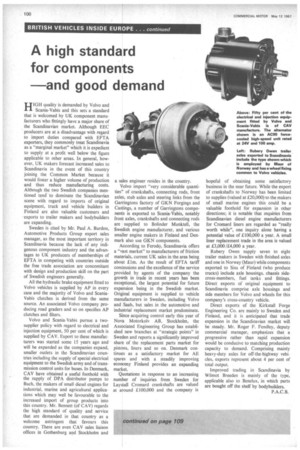A high standard for components and good demand
Page 102

If you've noticed an error in this article please click here to report it so we can fix it.
LTIGH quality is demanded by Volvo and Scania-Vabis and this sets a standard that is welcomed by UK component manufacturers who fittingly have a major share of the Scandinavian market. Although EEC producers are at a disadvantage with regard to import duties compared with EFTA exporters, they commonly treat Scandinavia as a "marginal market" which it is expedient to supply at a profit well below the figure applicable to other areas. In general, however, UK makers forecast increased sales to Scandinavia in the event of this country joining the Common Market because it would foster a higher volume of production and thus reduce manufacturing costs. Although the two Swedish companies mentioned tend to dominate the Scandinavian scene with regard to imports of original equipment, truck and vehicle builders in Finland are also valuable customers and • exports to trailer makers and bodybuilders are expanding.
Sweden is cited by Mr. Paul A. Burdon, Automotive Products Group export sales manager, as the most important territory in Scandinavia because the lack of any indigenous component industry and the advantages to UK producers of memberships of EFTA in competing with countries outside the free trade association are concomitant with design and production skill on the part of Swedish engineers generally.
All the hydraulic brake equipment fitted to Volvo vehicles is supplied by AP in every case and the majority of Volvo and ScaniaVabis clutches is derived from the same source. An associated Volvo company producing road graders and so on specifies AP clutches and filters.
Volvo and Scania-Vabis pursue a twosupplier policy with regard to electrical and injection equipment, 50 per cent of which is supplied by CAV. Export to these manufacturers was started some 15 years ago and will be expanded as the companies expand, smaller outlets in the Scandinavian countries including the supply of special electrical equipment to the Swedish army and of transmission control units for buses. In Denmark, CAV have obtained a useful foothold with the supply of DPA distributor pumps to Buch, the makers of small diesel engines for industrial, marine and agricultural applications which may well be favourable to the increased import of group products into this country. Mr. Bennett (of CAV) regards the high standard of quality and service that are demanded in that country as a welcome astringent that favours this country. There are even CAV sales liaison offices in Gothenburg and Stockholm and a sales engineer resides in the country.
Volvo import "very considerable quantities" of crankshafts, connecting rods, front axles, stub axles and steering links from the Garringtons factory of GKN Forgings and Castings, a number of Garringtons components is exported to Scania-Vabis, notably front axles, crankshafts and connecting rods are supplied to Bolinder Munktell, the Swedish engine manufacturer, and various smaller engine makers in Finland and Denmark also use GKN components.
According to Ferodo, Scandinavia offers a "vast market" to manufacturers of friction materials, current UK sales in the area being about £1m. As the result of EFTA tariff concessions and the excellence of the service provided by agents of the company the growth in trade in recent years has been exceptional, the largest potential for future expansion being in the Swedish market. Original equipment is supplied to vehicle manufacturers in Sweden, including Volvo and Saab, but sales in the automotive and industrial replacement market predominate.
Since acquiring control early this year of Nova Motorkolv AB, Stockholm, the Associated Engineering Group has established new branches at "strategic points" in Sweden and reports a significantly improved share of the replacement parts market for pistons, liners and so on. Denmark continues as a satisfactory market for AE spares and with a steadily improving economy Finland provides an expanding market.
Quotations in response to an increasing number of inquiries from Sweden for Laystall Cromard crankshafts are valued at around £100,000 and the company is hopeful of obtaining some satisfactory business in the near future. While the export of crankshafts to Norway has been limited to supplies (valued at £20,000) to the makers of small marine engines this could be a valuable foothold for expansion in other directions; it is notable that inquiries from Scandinavian diesel engine manufacturers for Cromard liners are regarded as "really worth while", one inquiry alone having a potential value of £100,000 a year. A small liner replacement trade in the area is valued at £3,000 /£4,000 a year.
Rubery Owen supply seven to eight trailer makers in Sweden with finished axles and one in Norway (Maur) while components exported to Sisu of Finland (who produce trucks) include axle housings, chassis sidecross-members, fuel tanks and fittings. Direct exports of original equipment to Scandinavia comprise axle housings and side members for Volvo and wheels for this company's cross-country vehicle.
Direct exports of the Kirkstall Forge Engineering Co. are mainly to Sweden and Finland, and it is anticipated that trade expansion in the Scandinavian market will be steady. Mr. Roger F. Fendley, deputy commercial manager, emphasizes that a progressive rather than rapid expansion would be conducive to matching production capacity to demand. Comprising mainly heavy-duty axles for off-the-highway vehicles, exports represent about 4 per cent of total output.
Improved trading in Scandinavia by Wilmot Breeden is mainly of the type, applicable also to Benelux, in which parts are bought off the shelf by bodybuilders.
P.A.C.B.
















































































































































































































































